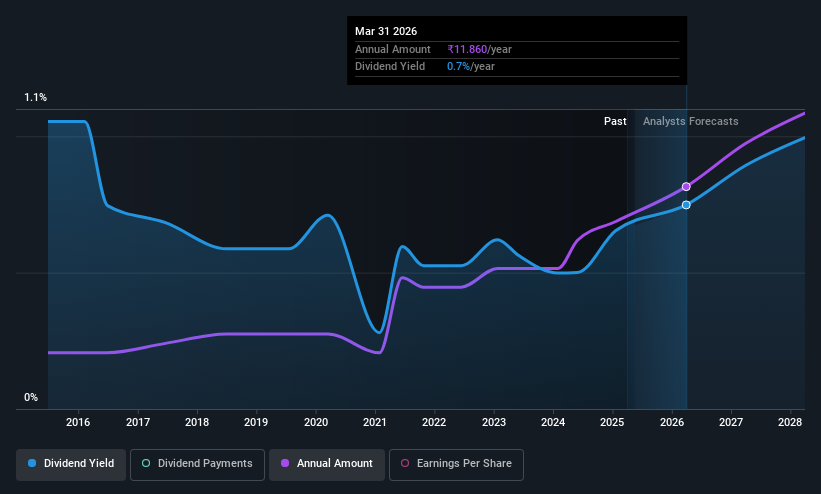Havells India Limited (NSE:HAVELLS) Passed Our Checks, And It's About To Pay A ₹6.00 Dividend
Havells India Limited (NSE:HAVELLS) is about to trade ex-dividend in the next 2 days. The ex-dividend date generally occurs two days before the record date, which is the day on which shareholders need to be on the company's books in order to receive a dividend. It is important to be aware of the ex-dividend date because any trade on the stock needs to have been settled on or before the record date. Accordingly, Havells India investors that purchase the stock on or after the 23rd of May will not receive the dividend, which will be paid on the 17th of July.
The company's next dividend payment will be ₹6.00 per share. Last year, in total, the company distributed ₹10.00 to shareholders. Looking at the last 12 months of distributions, Havells India has a trailing yield of approximately 0.6% on its current stock price of ₹1585.00. Dividends are a major contributor to investment returns for long term holders, but only if the dividend continues to be paid. So we need to check whether the dividend payments are covered, and if earnings are growing.
Dividends are typically paid from company earnings. If a company pays more in dividends than it earned in profit, then the dividend could be unsustainable. That's why it's good to see Havells India paying out a modest 43% of its earnings. A useful secondary check can be to evaluate whether Havells India generated enough free cash flow to afford its dividend. It paid out 84% of its free cash flow as dividends, which is within usual limits but will limit the company's ability to lift the dividend if there's no growth.
It's encouraging to see that the dividend is covered by both profit and cash flow. This generally suggests the dividend is sustainable, as long as earnings don't drop precipitously.
See our latest analysis for Havells India
Click here to see the company's payout ratio, plus analyst estimates of its future dividends.

Have Earnings And Dividends Been Growing?
Stocks in companies that generate sustainable earnings growth often make the best dividend prospects, as it is easier to lift the dividend when earnings are rising. If business enters a downturn and the dividend is cut, the company could see its value fall precipitously. Fortunately for readers, Havells India's earnings per share have been growing at 15% a year for the past five years. The company paid out most of its earnings as dividends over the last year, even though business is booming and earnings per share are growing rapidly. Higher earnings generally bode well for growing dividends, although with seemingly strong growth prospects we'd wonder why management are not reinvesting more in the business.
Another key way to measure a company's dividend prospects is by measuring its historical rate of dividend growth. Havells India has delivered an average of 9.6% per year annual increase in its dividend, based on the past 10 years of dividend payments. We're glad to see dividends rising alongside earnings over a number of years, which may be a sign the company intends to share the growth with shareholders.
The Bottom Line
From a dividend perspective, should investors buy or avoid Havells India? From a dividend perspective, we're encouraged to see that earnings per share have been growing, the company is paying out less than half of its earnings, and a bit over half its free cash flow. Overall we think this is an attractive combination and worthy of further research.
With that in mind, a critical part of thorough stock research is being aware of any risks that stock currently faces. In terms of investment risks, we've identified 1 warning sign with Havells India and understanding them should be part of your investment process.
Generally, we wouldn't recommend just buying the first dividend stock you see. Here's a curated list of interesting stocks that are strong dividend payers.
Have feedback on this article? Concerned about the content? Get in touch with us directly. Alternatively, email editorial-team (at) simplywallst.com.
This article by Simply Wall St is general in nature. We provide commentary based on historical data and analyst forecasts only using an unbiased methodology and our articles are not intended to be financial advice. It does not constitute a recommendation to buy or sell any stock, and does not take account of your objectives, or your financial situation. We aim to bring you long-term focused analysis driven by fundamental data. Note that our analysis may not factor in the latest price-sensitive company announcements or qualitative material. Simply Wall St has no position in any stocks mentioned.
 Wall Street Journal
Wall Street Journal